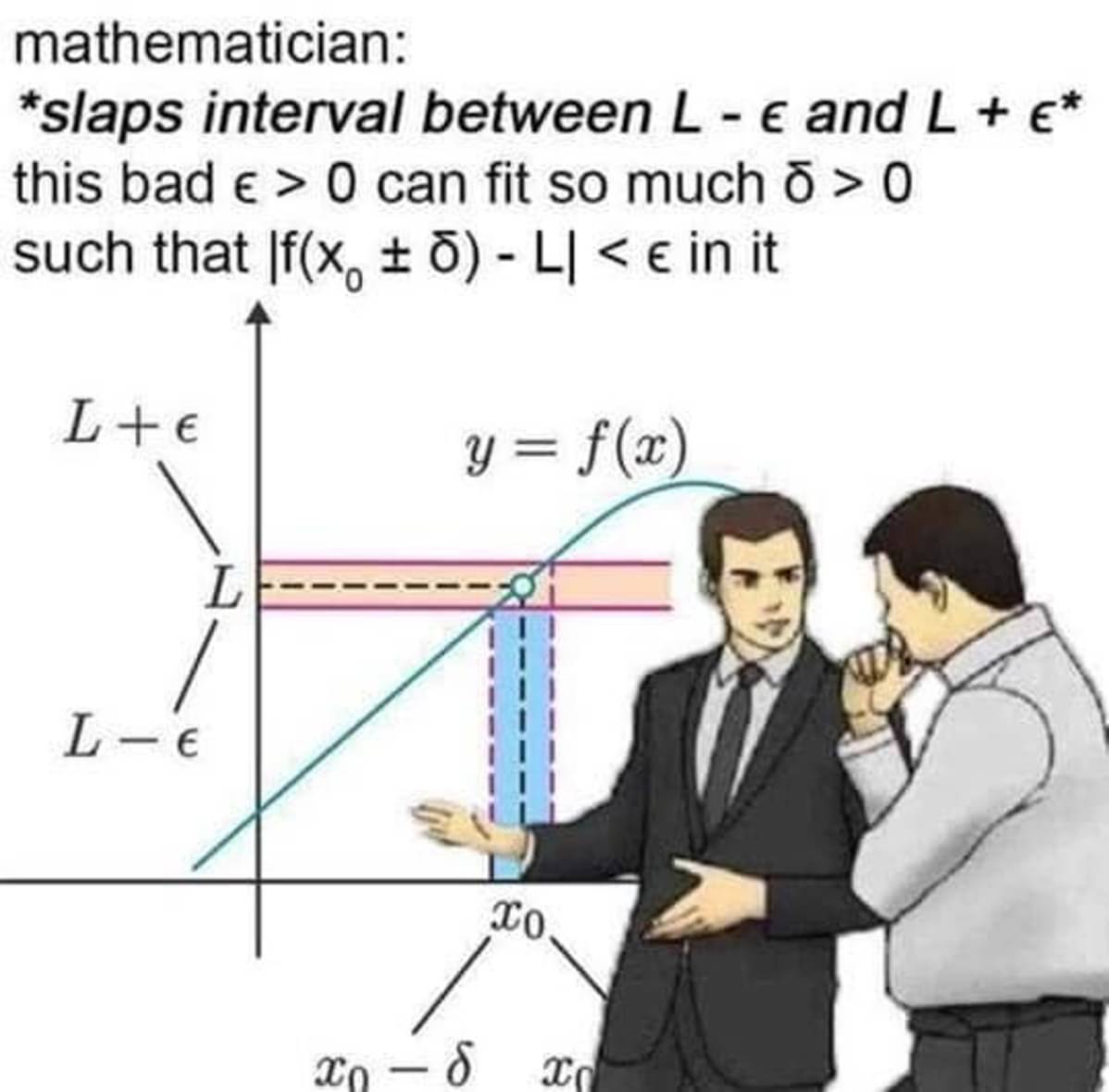Let epsilon < 0.
Science Memes
Welcome to c/science_memes @ Mander.xyz!
A place for majestic STEMLORD peacocking, as well as memes about the realities of working in a lab.

Rules
- Don't throw mud. Behave like an intellectual and remember the human.
- Keep it rooted (on topic).
- No spam.
- Infographics welcome, get schooled.
This is a science community. We use the Dawkins definition of meme.
Research Committee
Other Mander Communities
Science and Research
Biology and Life Sciences
- [email protected]
- [email protected]
- [email protected]
- [email protected]
- [email protected]
- [email protected]
- [email protected]
- [email protected]
- [email protected]
- [email protected]
- [email protected]
- [email protected]
- [email protected]
- [email protected]
- [email protected]
- [email protected]
- [email protected]
- [email protected]
- [email protected]
- [email protected]
- [email protected]
- [email protected]
- [email protected]
- [email protected]
- !reptiles and [email protected]
Physical Sciences
- [email protected]
- [email protected]
- [email protected]
- [email protected]
- [email protected]
- [email protected]
- [email protected]
- [email protected]
- [email protected]
Humanities and Social Sciences
Practical and Applied Sciences
- !exercise-and [email protected]
- [email protected]
- !self [email protected]
- [email protected]
- [email protected]
- [email protected]
Memes
Miscellaneous
I feel I should understand it, but it's just outside of my reach. It's now 10 years after university.
... That's enough real analysis for me today. Or ever, really.
I don't think you can use the x0 plus minus delta in the bracket (or anywhere), because then the function that's 1 on the rationals and 0 on the irrationals is continuous, because no matter what positive number epsilon is, you can pick delta=7 and x0 plus minus delta is exactly as rational as x0 is so the distance to L is zero, so under epsilon.
You have to say that
whenever |x - 0x|<delta,
|f(x) - L|<epsilon.
But I think this is one of my favourite memes.
unless f(x~0~ ± δ) is some kind of funky shorthand for the set { f(x) : x ∈ ℝ, | x - x~0~ | < δ }. in that case, the definition would be “correct”.
it’s much more likely that it’s a typo, but analysts have been known to cook up some pretty bizarre notation from time to time, so it’s not totally out of the question.
There's notation for that - (x0 - δ, x0 + δ), so you could say
f(x0 - δ, x0 + δ) ⊂ (L - ε, L + ε)
that would be a lot clearer. i’ve just been burned in the past by notation in analysis.
my two most painful memories are:
- in the (baby) rudin textbook, he uses f(x+) to denote the limit of _f _from the right, and f(x-) to denote the limit of f from the left.
- in friedman analysis textbook, he writes the direct sum of vector spaces as M + N instead of using the standard notation M ⊕ N. to make matters worse, he uses M ⊕ N to mean M is orthogonal to N.
there’s the usual “null spaces” instead of “kernel” nonsense. ive also seen lots of analysis books use the → symbol to define functions when they really should have been using the ↦ symbol.
at this point, i wouldn’t put anything past them.
Egregious. I feel your pain.
Feel weird correcting a meme, but that should be f(x)-L where x is between x_0 - delta and x_0 + delta. As written it looks like a definition that would only work for monotone functions.
x_0 - delta and x_0
Lemmy actually supports proper subscript (though not not clients do). Surround with tildes (single tildes, rather than the double tildes of strike-through).
x~0~ - δ is x~0~ - δ
Edit: and now, at least on Jerboa, the code block version is displaying incorrectly, although it now does support the actual subscript…
Yeah
I won't ever understand advanced maths, can someone explain me?
Not an advanced mathematician, but I think it's just saying that f(x-delta) between f(x + delta) is going to give a value between L - epsilon and L + epsilon.
I literally don't know what any of that means
Imagine you have a simple function: y = 2x
If you have two different x values (let's say 2 and 4), there exist a y value for every number in between them.
In this example, the y is going to be in between 4 and 8, for every x in between 2 and 4.
i still feel like this whole ε-δ thing could have been avoided if we had just put more effort into the “infinitesimals” approach, which is a bit more intuitive anyways.
but on the other hand, you need a lot of heavy tools to make infinitesimals work in a rigorous setting, and shortcuts can be nice sometimes
Infinitesimal approach is often more convoluted when you perform various operations, like exponentials.
Instead, epsilon-delta can be encapsulated as a ball business, then later to inverse image check for topology.
i think the ε-δ approach leads to way more cumbersome and long proofs, and it leads to a good amount of separation between the “idea being proved” and the proof itself.
it’s especially rough when you’re chasing around multiple “limit variables” that depend on different things. i still have flashbacks to my second measure theory course where we would spend an entire two hour lecture on one theorem, chasing around ε and η throughout different parts of the proof.
best to nip it in the bud id say
Calculus, Motherfucker! Do you speak it?!
Not a mathematician, but I'm pretty sure this isn't necessarily true. What if L is -1 and f(x) = x^2? Also I think your function has to be continuous.
You're right on all three counts. It's not always true, f(x0) has to be L, and the function has to be continuous.
